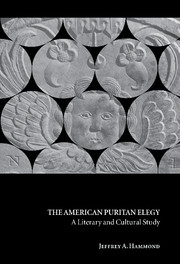Book contents
- Frontmatter
- Contents
- Preface
- Acknowledgments
- Introduction
- Chapter 1 Monuments enduring and otherwise
- Chapter 2 Toward an anthropology of Puritan reading
- Chapter 3 Weep for yourselves: the Puritan theology of mourning
- Chapter 4 This potent fence: the holy sin of grief
- Chapter 5 Lord, is it I?: Christic saints and apostolic mourners
- Chapter 6 Diffusing all by pattern: the reading of saintly lives
- Epilogue: Aestheticizing loss
- Notes
- Works cited
- Index
Chapter 5 - Lord, is it I?: Christic saints and apostolic mourners
Published online by Cambridge University Press: 22 September 2009
- Frontmatter
- Contents
- Preface
- Acknowledgments
- Introduction
- Chapter 1 Monuments enduring and otherwise
- Chapter 2 Toward an anthropology of Puritan reading
- Chapter 3 Weep for yourselves: the Puritan theology of mourning
- Chapter 4 This potent fence: the holy sin of grief
- Chapter 5 Lord, is it I?: Christic saints and apostolic mourners
- Chapter 6 Diffusing all by pattern: the reading of saintly lives
- Epilogue: Aestheticizing loss
- Notes
- Works cited
- Index
Summary
The occasion of death forced New England's elegists to choose between facility and honesty, between writing an aesthetically assertive poem or a poem that spoke more directly to the sin that grief exposed. This was not an especially difficult decision: to choose properly was to align oneself with Puritan attitudes toward poetry generally. The deeper dilemma of elegy stemmed from the mandate of rigorous self-examination in the face of loss – and it centered on the poet's motives for writing. The holy sin of grief created an uneasy space between incoherent babbling and rueful silence, between giving free rein to sorrow and not writing at all. Poets caught in this disturbing position registered ambivalence toward the limitations imposed by elegiac conventions. We have seen that even though they complained at being “Curb'd, and rein'd-in by measur'd Poetry,” in Urian Oakes's phrase (Meserole 208), they accepted such restrictions as necessary vehicles for fulfilling the resurrective mandate of a truly Christian lament. In this, too, lay a submission of will. Elegies were written not just to honor the dead but to make mourners more like them, and to translate human tears into a vehicle for furthering God's work in the world was to imitate the piety of the souls being commemorated. The spiritual and the artistic problems of elegy thus found identical resolution in a repudiation of self, both as worldly mourner and as professional poet.
- Type
- Chapter
- Information
- The American Puritan ElegyA Literary and Cultural Study, pp. 135 - 168Publisher: Cambridge University PressPrint publication year: 2000



